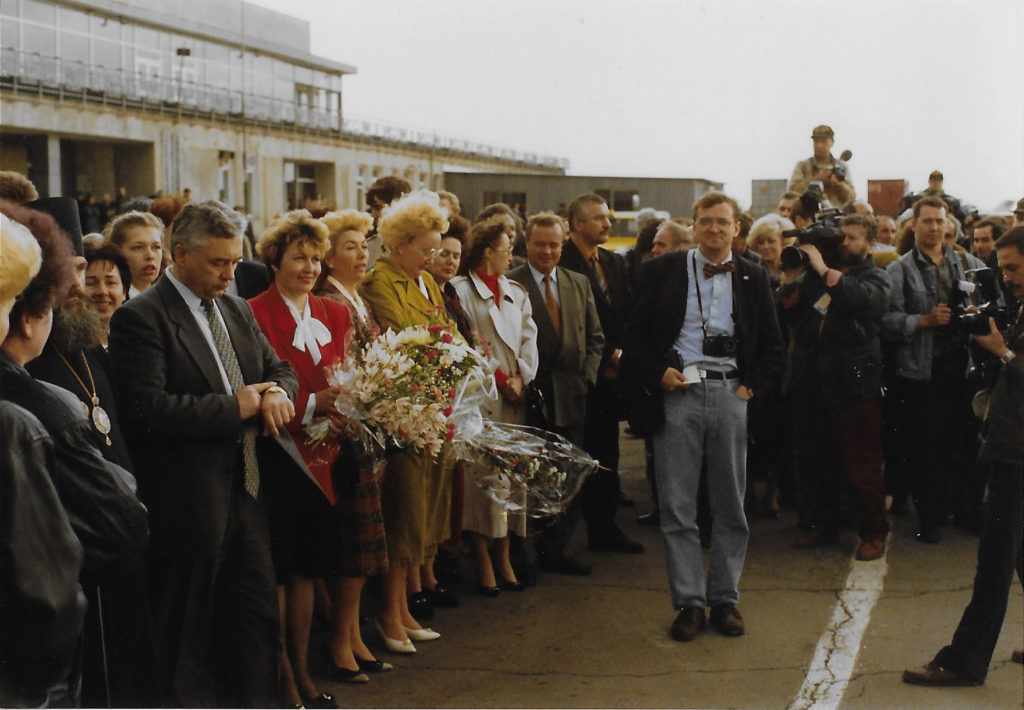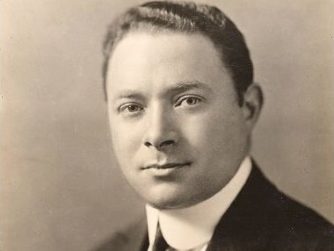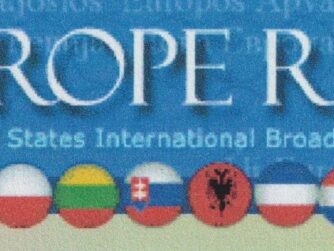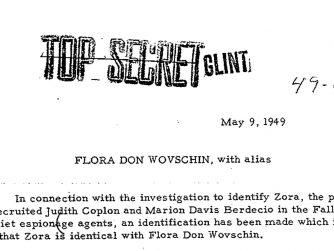OPINION
How Voice of America Censored Solzhenitsyn
Radio Liberty Fails on Russian Interference
By Ted Lipien
The vast majority of political propaganda and disinformation in U.S. media is originated domestically by American commentators, partisan think-tanks, reporters and social media users. But all too often, U.S. government officials, as well as journalists, both government-hired as in the Voice of America’s (VOA) case, and those working for private media, have been intimidated or otherwise influenced by foreign propaganda, and, all too often, they helped to legitimize and spread Soviet and Russian propaganda messages when most Americans assumed that these reporters’ job was to expose such propaganda. This happened when Nobel Prize-winning Russian writer Alexandr Solzhenitsyn was forced into exile in the West by the Soviet government in 1974. It happened again with Russian government’s interference in the 2016 U.S. presidential election. In both cases, instead of promptly countering foreign propaganda, many American journalists helped the Russian propaganda achieve its goals by their lack of professional curiosity and their uncritical reporting.
Regardless of whether Russian interference had cost her the 2016 election, or more likely undermined the confidence of Americans in the electoral process, Hillary Clinton has a good reason to be upset with U.S. taxpayer-funded media outlets of the Broadcasting Board of Governors (BBG). The Voice of America, and especially the Russian Service of Radio Liberty (RL), both of which are managed by the BBG, a $740 million U.S. federal government agency in Washington, D.C., should have been the first ones to investigate and expose Russian meddling in last year’s U.S. election campaign and they should have done it in real time. They are supposed to have some of the most knowledgeable government-hired experts on Russia. They had more journalists in Russia than probably any other U.S. news organization.
Had VOA and RL done their job right, they might have stopped the Russian interference and protected the American electoral system from foreign influence. Had RL done what it was created to do, it would have been good not just for Hillary Clinton but also for Donald Trump, as it would have removed many lingering doubts and might have forced Trump to get rid of his compromised pro-Putin advisors much sooner than he eventually did and to prevent them from getting any positions within the Trump administration.
Radio Free Europe/Radio Liberty (RFE/RL) in particular is expected to specialize in exactly the type of investigative reporting in Russia that was needed to uncover the Russian government’s direct meddling in American domestic politics. But as the U.S. election campaign was getting underway, RFE/RL’s management dismissed one of its most enterprising investigative reporters, Anastasia Kirilenko who earlier had uncovered evidence of bribery and corruption linked to President Putin.[ref]”A Putin Corruption Reporter Too Radical For Radio Liberty Radio Liberty: CONVERSATION WITH FORMER RADIO LIBERTY INVESTIGATIVE REPORTER ANASTASIA KIRILENKO – PART I,” BBG Watch, January 25, 2016, accessed October 26, 2017, http://bbgwatch.com/bbgwatch/a-putin-corruption-reporter-too-radical-for-radio-liberty/.[/ref]
Instead of focusing their undivided attention on investigating how RT and SPUTNIK were trying to disrupt the U.S. presidential election by buying political ads to influence American voters, RFE/RL managers were busy in the summer of 2016 preparing for a visit in Moscow of a delegation of high-ranking BBG officials. RL managers and journalists scrambled to make arrangements for the important visitors from Washington to meet with officials of the Russian Foreign Ministry at the Radio Liberty Moscow Bureau’s 25th anniversary party in one of the Russian capital’s fancy hotels.
“… representatives of the [Russian] Foreign Ministry … have been invited,” Radio Liberty reporters in Russia were informed by the management in Prague, Czech Republic, where RFE/RL has its headquarters after the post-Cold War move of the radios there from Munich, Germany.[ref]Email to RFE/RL Moscow bureau dated July 4, 2016.[/ref] The most senior BBG official coming to Moscow for what was later described as a private visit, presumably to engage in corporate business in Russia for Universal Filmed Entertainment Hollywood company, was the then BBG Board chairman, Jeff Shell. Appointed to his position by President Obama as a Democrat on the bipartisan government board in charge of VOA, RFE/RL and other U.S.-funded media entities serving foreign audiences, he was accompanied on the trip to Moscow by BBG CEO John F. Lansing, whom he had recommended in 2015 for this position, and Lansing’s deputy Jeff Trimble. Both of them were traveling in official capacity as U.S. government employees. The previous BBG interim chairman, former CEO of Sony Entertainment, Inc., Michael Lynton, also an Obama-appointed Democrat on the BBG Board, was also known to do corporate business in Russia and in China.[ref] Ted Johnson, “Michael Lynton Resigns from Broadcasting Board of Governors,” Variety, May 23, 2013 accessed October 30, 2017, http://variety.com/2013/film/news/michael-lynton-resigns-from-broadcasting-board-of-governors-1200487214/.[/ref] Jeff Shell in his private corporate capacity as chairman of Universal Filmed Entertainment Group has signed last year a $450 million business deal with a Chinese company.[ref]Ryan Faughnder, “China’s Perfect World to invest up to $450 million in Universal film slate,” The Los Angeles Times, February 17, 2016, accessed October 30, 2017, http://www.latimes.com/entertainment/envelope/cotown/la-et-ct-china-perfect-world-universal-deal-20160217-story.html.[/ref] During the Cold War, official U.S. foreign policy objectives sometimes led to censorship at the Voice of America, as in Solzhenitsyn’s case, but it would have been completely unthinkable for any official in charge of the Voice of America and Radio Free Europe and Radio Liberty broadcasting to be also making corporate business deals in the Soviet Union and in communist China.
To the surprise and embarrassment of the BBG officials, the Russian authorities refused Shell entry at the airport and sent him back after a short humiliating detention and interrogation, while allowing Lansing and Trimble to enter. For those familiar with the history of Soviet active measures, the airport incident had all the hallmarks of a carefully staged FSB provocation to let RFE/RL and BBG management and their journalists know in no uncertain terms that President Putin was not going to tolerate BBG reporting from Russia harmful to his interests and schemes.
It was not at all a new message, but in subsequent months in 2016, Radio Liberty did not initiate any substantial exposures of the Russian government’s media disruption activities in the United States. RL did not break any major stories on Russian disinformation that other news organizations had not already disclosed. RL did not issue any warnings while the Russian propaganda interference in the U.S. election campaign was still going at full speed. Neither did the Voice of America. It seems doubtful that Broadcasting Board of Governors bureaucrats in Washington were encouraging VOA or RL journalists to do aggressive investigative reporting on anything that might cause President Putin to order the closing of their large news bureau in Moscow. One can be sure that Putin would close it down immediately if RL became too effective and too dangerous for his authoritarian rule.
During the Cold War, this kind of leverage for Soviet blackmail against VOA, RL and RFE/RL simply did not exist. The Soviet government could not kick RL or VOA out of Moscow, because they were not there. The KGB, which stood for the Committee for State Security in the Soviet Union in existence from 1954 until 1991, had to resort to trying to infiltrate the RL Russian Service in Munich, West Germany, where the station was then located, and to conduct constant propaganda and disinformation campaigns aimed at discrediting RL’s journalists and their American management. During that time, it was necessary for the KGB to use dozens of operatives and agents of influence in the West to harass and try to discredit Alexandr Solzhenitsyn. These efforts required enormous resources. The KGB’s objective was to use Western media to create a public image of Solzhenitsyn in the West as a reactionary and highly suspect figure. The objective of Russian propaganda in 2016 was to undermine American voters’ confidence in Hillary Clinton using RT and SPUTNIK, U.S. media, Facebook, Twitter, and YouTube.
While the Soviets managed to intimidate the Nixon and Ford administrations and the Voice of America, they were not successful against Radio Liberty which was then under an independent management of the Board for International Broadcasting (BIB) and was not linked to VOA. Today, both VOA and RFE/RL are managed by the same U.S. government bureaucracy within the Broadcasting Board of Governors and have similar problems, including low employee morale. When VOA’s senior managers led by director Amanda Bennett made their decision to shorten a live TV and Facebook interview with Chinese whistleblower Guo Wengui, their action came immediately after officials of the Chinese Foreign Ministry told the VOA correspondent in Beijing that future visas for VOA reporters traveling to China would be in jeopardy if the interview were to be broadcast. Almost immediately the interview was shortened on the orders of senior VOA managers and several VOA Mandarin Service journalists who protested against this decision were put on forced leave with pay. VOA’s reputation in China was ruined.
Russia has been resorting to a similar form of blackmail against Radio Liberty. President Putin would not be worthy of his KGB heritage, if the KGB’s successor, the FSB–the Federal Security Service of the Russian Federation–had not established a close watch over the RL bureau in Moscow and subjected its managers and employees to secret attempts at intimidation. Keeping RFE/RL alive in Moscow is surely an anomaly under President Putin, given that just about all other Western NGOs, foundations, and human rights organizations have been systematically purged from Russia over the last several years. The big question is why has RFE/RL escaped not so much scrutiny but retribution by Putin’s henchmen? Of course, the answer is clear: it has been reasonably unmolested because it is doing nothing to anger Putin, or it may be doing something to please him; or Putin’s agents have so thoroughly invaded it that to close it down would jeopardize a successful FSB operation.
During the Cold War, the KGB had to sent out its operatives to the West to pursue and try to intimidate RL journalists without much success, even though a few RFE and RL journalists in the West had been assassinated by secret services of various Soviet Block nations. In the 1970s, RL would not be forced into banning Solzhenitsyn, as VOA was, neither by the KGB nor by pressure from the Nixon and Ford administrations in response to Soviet propaganda against him. Readings from his Gulag Archipelago exposing Stalin’s crimes continued daily for many months in RL broadcasts to Russia.
In 2016, RL’s management was inviting Russian Foreign Ministry officials to meet with the BBG chairman coming to Russia on a corporate business trip. They were no doubt hoping that the Russian Foreign Ministry would help to moderate the pressure on RL’s staff from the FSB. It would not. Rendered largely ineffective after many decades of successes during the Cold War, Radio Liberty’s operations in Russia are now at the complete mercy of Putin’s security service. One possible reason for allowing RL and VOA to stay in Russia is to give the Russian government a legal justification and leverage for keeping its own far more effective presence of RT and SPUTNIK journalists in the United States.
Even if RT and SPUTNIK did not manage to influence the final result of the 2016 U.S. presidential election, they caused a tremendous damage to America’s political life and media’s credibility, while the Voice of America, and particularly Radio Liberty, did nothing to prevent it with timely reporting on the details of the Russian interference. It was a major failure of the Broadcasting Board of Governors, far more damaging, in this case for the United States, than any censorship at the Voice of America during the period of detente, but perhaps not as damaging in its longterm effects as VOA’s propaganda for Stalin during World War II and VOA’s unquestioned support for his territorial conquests.
When Russia’s propaganda outlet RT (formerly Russia Today, not to be confused with RL) posted a commentary tiled “Russophobia: RT rates the top 10 Kremlin critics & their hilarious hate campaigns,” neither RL nor VOA or any of their reporters made the list.[ref]”Russophobia: RT rates the top 10 Kremlin critics & their hilarious hate campaigns,” RT, September 28, 2017, accessed October 27, 2017, https://www.rt.com/uk/404930-russophobia-kremlin-critics-paranoia/.[/ref] Senator John McCain was number one and Hillary Clinton was number four. When I commented that during the Cold War, Radio Liberty and VOA would be at the top of any such Soviet list of enemies of peace, progress, communism, and the Soviet Union, former RL Russian Service reporter Anastasia Kirilenko, replied in a Facebook comment: “Because radio liberty is under FSB control now. And I think Mr Mc Cain knows it… .”[ref]Anastasia Kirilenko comment on the author’s Facebook post with a link to RL report “Russophobia: RT rates the top 10 Kremlin critics & their hilarious hate campaigns” from September 30, 2017, accessed October 27, 2017, https://www.facebook.com/tedlipien/posts/10209079925586572.[/ref] As a young RFE/RL reporter, Kirilenko had interviewed Marina Salye, a Russian politician who in 1992 headed a special commission in St. Petersburg that investigated Vladimir Putin, then chairman of the city’s Foreign Relations Committee, and accused him of major corruption. It was one of Radio Liberty’s major journalistic accomplishments.[ref]”No Particular Radio Liberty Support For Interview With Putin’s Accuser,” BBG Watch interview with former Radio Liberty Russian Service investigative reporter Anastasia Kirilenko, January 25, 2016, accessed October 30, 2017, http://bbgwatch.com/bbgwatch/no-particular-radio-liberty-support-for-interview-with-putins-accuser/.[/ref]
Kirilenko is not the only Russian journalist dismissed by the station’s management in recent years. Another well-known RL journalist working on a freelance contract was also let go after posting a commentary on how agents of influence for Putin in the United States advance Russian government’s propaganda. RL quickly removed the commentary. In almost all of these cases, RL’s management claimed that the journalists and commentators did not follow standard journalistic practices, the same explanations advanced by the VOA management when it censored in 1974 Russian Nobel Prize-winning author of The Gulag Archipelago, Alexandr Solzhenitsyn, as well as in the recent case of the shortened VOA Mandarin Service interview with Chinese whistleblower Guo Wengui on April 19, 2017.[ref]Evelyn Cheng, “How an interview with one Chinese billionaire threw a US broadcaster into turmoil,” CNBC, June 9, 2017, accessed October 30, 2017, https://www.cnbc.com/2017/06/09/interview-with-guo-wengui-throws-voice-of-america-into-turmoil.html.[/ref]
Had RL done its job last year the same way the Munich-based radio station was working during the Cold War, Putin’s operation to disrupt the U.S. presidential election in 2016 could have been exposed and blocked at its outset. Hillary Clinton now has yet another big proof in support of her claim from 2013 that the Broadcasting Board of Governors is “practically defunct.” She was also right in saying, “We’re not doing what we did during the Cold War.”[ref]Secretary of State Hillary Clinton, January 23, 2013, Testimony to the House Committee on Foreign Affairs. HILLARY CLINTON: “Our Broadcasting Board of Governors is practically defunct in terms of its capacity to tell a message around the world. So we’re abdicating the ideological arena and we need to get back into it. We have the best values. We have the best narrative. Most people in the world just want to have a good decent life that is supported by a good decent job and raise their families and we’re letting the Jihadist narrative fill a void. We have to get in there and compete and we can do it successfully.”[/ref]
Discovering Russian government’s U.S. election Facebook, Twitter and YouTube ads should not have been difficult for RL if its journalists were not afraid to seek out the story, gather the necessary evidence and report on it. RL has a large news bureau in Moscow and a large number of reporters who live and work in Russia. VOA also has a few reporters and freelancers in Russia. Russian propaganda outlets, RT and SPUTNIK, have news bureaus in the United States. But whenever the U.S. keeps a large number of government-paid journalists in countries known to be run on the political and business level by the security services mafia, as is the case with Russia and China, BBG journalists and their U.S. government bosses in Washington become the prime target of propaganda influence and blackmail. It often leads to promoting self-censorship in the form of producing more innocuous programs to avoid being kicked out from a foreign country or to have one’s broadcasts jammed or blocked.
This kind of blackmail by Russia and China has worked also the same way at the highest government levels in Washington. Whether the leverage was preventing another alliance between Stalin and Hitler during World War II, arms control during the Cold War, or influence over North Korea today, Moscow, and Beijing in the case of North Korea, express their displeasure with American support for human rights through propaganda, disinformation and blackmail. Too many times, it has led to censorship by U.S. administration officials as well as to self-censorship by Voice of America managers, editors and journalists. RFE/RL management has been affected by it in recent years as well.
Some key BBG and VOA officials or their family members have been in charge of corporations doing a booming business in China. When in the 1970s, VOA Russian Service chief Victor Franzusoff was stymied by the management in his numerous attempts to interview Alexandr Solzhenitsyn and to get him to read for VOA from his Gulag Archipelago literary and historical masterpiece describing the murderous rule of Lenin and Stalin, he wrote later in his memoirs that much of what he had been forced to broadcast by VOA’s leadership was centrally-produced “fluff.”[ref]Victor Franzusoff, Talking to the Russians: Glimpses of History by a Voice of America Pioneer (Santa Barbara: Fithian Press, 1998), 145.[/ref] RL Russian and VOA Chinese journalists express the same complaints today; it is yet another reason to study and understand Voice of America’s censorship of Solzhenitsyn and the role of Soviet and now Russian propaganda and its impact in VOA’s history.[ref]Emails and comments from RFE/RL and VOA journalists sent to the author.[/ref]
Main article for “How Voice of America Censored Solzhenitsyn” Cold War Radio Museum Exhibit in November 2017:
SOLZHENITSYN Target of KGB Propaganda and Censorship by Voice of America
Chapters
Solzhenitsyn – Target of Red Propaganda
Censorship at the Voice of America – A Historical Background
Decision to Ban Solzhenitsyn from VOA
Political Fallout for President Ford
Fallout for VOA Managers During Reagan Years
Criticism in Congress
VOA Foreign Broadcasters Against Institutional Censorship
Solzhenitsyn Criticizes VOA and Radio Liberty in 1982
A Partial Reconciliation with VOA
Solzhenitsyn Records for VOA
KGB, Solzhenitsyn and U.S. Media
Another Solzhenitsyn Reading on VOA
Conclusions
Photos: (Top) Alexandr Solzhenitsyn and his wife Natalia Dmitriyevna Solzhenitsyn exiting from Alaska Airlines plane upon their arrival on May 27, 1994 in Vladivostok as they returned from exile in the United States.
(Bottom) Local Russian officials and VOA reporter Ted Lipien awaiting the arrival of Alexandr Solzhenitsyn in Vladivostok on May 27, 1994. VOA had no plans for on-the-ground coverage of Solzhenitsyn’s arrival in Russia, but Ted Lipien and VOA Russian Branch Chief Sherwood Demitz who were in Vladivostok on a marketing trip to promote rebroadcasting of VOA programs by local radio stations sent in a report to Washington.
Disclosure: Ted Lipien was VOA acting associate director in charge of central news programs before his retirement in 2006. In the 1970s, he worked as a broadcaster in the VOA Polish Service and was a reporter and service chief in the 1980s during Solidarity’s struggle for democracy in Poland. He is one of the co-founders and supporters of BBG Watch whose volunteers monitor management and performance of taxpayer-funded Voice of America and other U.S. government-run media operations within the Broadcasting Board of Governors.









